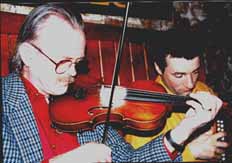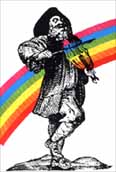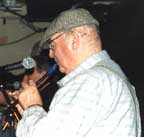They have found quickly a replacement of the same high quality as new top act - there are enough musicians who would love to be part of this prestigious festival which sometimes opens doors to the Continental market. "We had to get back all the posters that were already printed - about 25.000. On the new ones, Solas is no longer written on, but the Niamh Parsons Band."
 No doubt that Niamh Parsons, one of the best traditional singers from Ireland, is a great top act to celebrate the first quarter century of the festival tour. Niamh will be joined in her band by former Danú fiddler Daire Bracken, bodhrán and percussion player Steve Dunford, guitarist Graham Dunne and accordeonist Dave Munnelly. The other anniversary tour guests are the trad band Beginish, then Davey Arthur (who had been part of the first Irish Folk Festival tours in 1974 and 1975) along with Seamus Creagh, and finally the former Cherish the Ladies singer Cathy Ryan, joined by Peter Barnes and Greg Anderson.
No doubt that Niamh Parsons, one of the best traditional singers from Ireland, is a great top act to celebrate the first quarter century of the festival tour. Niamh will be joined in her band by former Danú fiddler Daire Bracken, bodhrán and percussion player Steve Dunford, guitarist Graham Dunne and accordeonist Dave Munnelly. The other anniversary tour guests are the trad band Beginish, then Davey Arthur (who had been part of the first Irish Folk Festival tours in 1974 and 1975) along with Seamus Creagh, and finally the former Cherish the Ladies singer Cathy Ryan, joined by Peter Barnes and Greg Anderson.
The Irish Folk Festival (not to be confused with the St. Patrick's Day Celebration tour organised by Petr Pandula) exists since 1974, and is the oldest of the German Celtic Folk Festival tours. The Festival has yet presented 18 tours (in a couple of years the tour did not take place); since 1988 it has taken place every year again. All in all, 145 different musicians (from Ireland, along with a few from the United States, Scotland, England and Brittany) have participated, and 427 concerts have taken place in 100 different towns. Nearly half a million visitors have come to the tours, mainly in Germany, with sometimes extensions to Switzerland, Austria or Denmark. Over the 25 years, the size of the festival tour has stayed always quite at the same level: Mostly ca. three weeks long, with between 13 and 17 musicians, and concerts with an average 1.000 head audience. These 1.000 visitors per evening were needed as soon as - after a few wild first tours - the festival became more musician-friendly, with a chartered tour bus with driver and accommodation in single rooms in hotels. Both organisers, Carsten Linde and Axel Schuldes, have a permanent job since a long time, and do the festival tour parallely more as a hobby.
The whole story started in the early 70s when Carsten Linde discovered the Furey brothers, after having been an important person in the German folk scene already in the 60s promoting American folk music. He was impressed by them, and thought that this kind of music should be brought to a bigger audience than just the back rooms of pubs. These thoughts resulted in the first Irish Folk Festival Tour in May 1974, which was quite a Furey invasion, with Eddie, Finbar, George Paul and father Ted, joined by Davey Arthur and Bobby Clancy representing the emigrated Irish. The second festival presented again several Fureys, but also Clannad and Micho Russell. "The idea of combining a festival and a tour was new, and that has been and is still one of the reasons of the success of the IFF."
Today, the Irish Folk Festival has the reputation as one of Europe's most important tours for Irish Folk music. What rank does it have today for Irish Music? Thinks Axel, "I hope quite the same as it had right from the start, which is defined by the intention of the festival. The Irish Folk Festival has never wanted to be a trend setter; it never wanted to define what is important in the Irish Folk Scene. It always tried to be a reflection, a micro cosmos of what is happening in the Celtic scene in Ireland." Still, the organisers were often very much in time with the Irish scene; a good example being that Clannad played as a brand new band on the second Irish Folk Festival in 1975.
 The importance of the maxim to reflect the current scene in Ireland is also represented in the break of the IFF between 1982 and 1987. "The scene not only in Germany was at a low point - mainly because of ‚overfeeding' with too much poor quality music from Ireland -, simultaneously in Ireland there did not happen very much. So we were consistent and stopped the tour for some years. Until in the mid-eighties, with Moving Hearts, new life was breathed into the scene. The scene simply had to regenerate a bit after the huge boom in the 70s. When the Irish tree was in full bloom once again in the end of the 80s, the Irish Folk Festival tour came back in 1988."
The importance of the maxim to reflect the current scene in Ireland is also represented in the break of the IFF between 1982 and 1987. "The scene not only in Germany was at a low point - mainly because of ‚overfeeding' with too much poor quality music from Ireland -, simultaneously in Ireland there did not happen very much. So we were consistent and stopped the tour for some years. Until in the mid-eighties, with Moving Hearts, new life was breathed into the scene. The scene simply had to regenerate a bit after the huge boom in the 70s. When the Irish tree was in full bloom once again in the end of the 80s, the Irish Folk Festival tour came back in 1988."
Being asked about the current state of success of the festival, Axel says that their local organisers feel a general difficulty in the German concert scene, equally if it is a smaller or a medium sized event. Only mega events like Elton John or Pavarotti go really well at the moment. Still, the IFF tour organisers are happy with the current state of their festival tour. "Of course, a few more visitors are always welcome, but in general we are content with the acceptance." Reason for the long term popularity of the festival tour are in Axel's opinion on the one hand the variety of the event, with a different line-up each year, on the other hand the general popularity of Irish Music in Germany. "Maybe we support a bit the popularity, but first of all the popularity helps us."
The huge success of Riverdance (more than 1 Mio. visitors in Germany) is believed by many people to promote the interest in Irish Folk and Trad Music on an huge scale - but this seems to be a myth. "We were surprised to see that there was no influence at all on the IFF - neither positive nor negative. We have tried to pull Riverdance visitors to our festival who have not yet been Irish Folk fans - it does not work. Although these dancers and musicians come from Ireland, it is much more than Irish Music and Dance - it is a huge entertainment thing, a huge show, more on the level of Musicals. We have heard as good as never from anybody who came out of a Riverdance show and was mainly fascinated by the music, wanted to have more of the music. On the other hand, we have not lost by Riverdance either. There was no effect on the IFF. In the end, Riverdance is a totally different dimension and in fact also a different genre."
 Meanwhile, the tour organisers have to struggle hard with the so-called "Ausländersteuer", a tax introduced two years ago, which is charged on foreign performers playing in Germany and is much higher than the usual tax on performers with a German passport. On smaller club tours the local organiser has to pay the tax and the agency has the job to convince the local organiser to book nevertheless foreign artists, but for a tour of the size of the Irish Folk Festival, the Ausländersteuer is the problem of the tour, and not the local, organisers.
Meanwhile, the tour organisers have to struggle hard with the so-called "Ausländersteuer", a tax introduced two years ago, which is charged on foreign performers playing in Germany and is much higher than the usual tax on performers with a German passport. On smaller club tours the local organiser has to pay the tax and the agency has the job to convince the local organiser to book nevertheless foreign artists, but for a tour of the size of the Irish Folk Festival, the Ausländersteuer is the problem of the tour, and not the local, organisers.
Since the introduction of the Ausländersteuer, Axel and Carsten have to sit much longer and count again and again. Axel underlines that the tax is not shifted upon the musicians. "Of course you have to explain to the artists that Germany is not a land of Cockaigne for Irish musicians, that this tax exists and what consequences it has, that the musician's salaries need to stay in a realistic size; but you must not cut the salary of the musicians. Especially in these hard times it is very important to have sponsors to take a bit of the financial pressures. A festival like this, with foreign artists, is these days impossible without sponsors. You have to try to get some money from sponsors, but please not from the musicians." This year, once again, the tour is sponsored by Murphy's and Tullamore Dew.
Despite these financial struggles, the hard work of organising the tour and all the difficulties that have been part of the first 25 years of the festival, running the festival has always been a very rewarding thing for both the organisers. Most of the musicians who have been part of the festival have become good friends, and they have many good memories from all the years.
 The classic anecdotes are about the late Micho Russell from Doolin, who has been five times with the festival. "He has always fascinated us in how he knew to help himself. Often we were reproached by the audience that we had pulled him out of his small rural context to present him as a display figure on stage - these people have no idea how much pleasure Micho Russell had over here. And he knew how to master situation - for example, on his first trip to Germany, Micho missed already in Oostende in Belgium the Furey Brothers who should have taken him up in their van. Micho found his way to the first concert of the tour anyway, and did not understand at all why we should have been worried about him - just because he was coming from the little village of Doolin and had not yet seen the big wide world, why he should not find the connection to this big tour."
The classic anecdotes are about the late Micho Russell from Doolin, who has been five times with the festival. "He has always fascinated us in how he knew to help himself. Often we were reproached by the audience that we had pulled him out of his small rural context to present him as a display figure on stage - these people have no idea how much pleasure Micho Russell had over here. And he knew how to master situation - for example, on his first trip to Germany, Micho missed already in Oostende in Belgium the Furey Brothers who should have taken him up in their van. Micho found his way to the first concert of the tour anyway, and did not understand at all why we should have been worried about him - just because he was coming from the little village of Doolin and had not yet seen the big wide world, why he should not find the connection to this big tour."
Another historic anecdote is the only tour in the German Democratic Republic in 1989. After a long struggle with the GDR government, the organisers got the permission to travel for five concerts to the GDR. All concerts were totally packed, with hundreds of people having to stay in front of the venues. (As an irony of history, after the wall came down and there were no political problems to tour in the Eastern Länder, there has generally been a too small interest to make concerts financially possible.) Axel remembers being asked from the musicians if the wall would come down some day, and answering that he would not believe this to happen during his life time. The last of these five concerts happened on 30.10.1989. Just a few days later history was made...
The dates for the Irish Folk Festival 1999 are:
14.10. Herisau, Casino - 15.10. Basel, Stadtcasino - 16.10. Zürich, Volkshaus - 17.10. Bern, Theater im National - 19.10. Berlin, HdK - 20.10. Berlin, HdK - 21.10. Bremen, Pier 2 - 22.10. Kreuztal, Stadthalle - 23.10. Düsseldorf, Tonhalle - 24.10. Northeim, Stadthalle - 25.10. Hamburg, Musikhalle - 26.10. Essen, Saalbau - 27.10. Fellbach, Schwabenlandhalle - 28.10. Dreieich, Bürgerhaus - 29.10. Ulm, Roxy - 30.10. Landsberg, Sportzentrum - 31.10. München, Circus Krone
Part I of the European Silver Jubilees covers this year's 25th Tønder Festival.
Photo Credit:
(1) The Irish Folk Festival Fiddler
(2) Niamh Parsons, Photo by The Mollis
(3) Seamus Creagh with Aidan Coffey, Photo by Sean Laffey
(5) Micho Russell, Photo by The Mollis
Back to the content of FolkWorld Articles & live reviews
To the content of FolkWorld online magazine Nr. 11
© The Mollis - Editors of FolkWorld; Published 10/99
All material published in FolkWorld is © The Author via FolkWorld. Storage for private use is allowed and welcome. Reviews and extracts of up to 200 words may be freely quoted and reproduced, if source and author are acknowledged. For any other reproduction please ask the Editors for permission.
FolkWorld - Home of European Music

Layout & Idea of FolkWorld © The Mollis - Editors of FolkWorld
 For the 25th anniversary, the Irish Folk Festival tour had a unfortunate premiere. For the first time ever, the new management of a band rejected the contracts the former management had signed with the festival makers. In the end, the organisers of this prestigious German tour were forced to find a new top act for their anniversary tour. It is a strong proof of the reputation and professionalism of the festival that it managed to be able to present nevertheless a programme of highest quality.
For the 25th anniversary, the Irish Folk Festival tour had a unfortunate premiere. For the first time ever, the new management of a band rejected the contracts the former management had signed with the festival makers. In the end, the organisers of this prestigious German tour were forced to find a new top act for their anniversary tour. It is a strong proof of the reputation and professionalism of the festival that it managed to be able to present nevertheless a programme of highest quality.
 No doubt that Niamh Parsons, one of the best traditional singers from Ireland, is a great top act to celebrate the first quarter century of the festival tour. Niamh will be joined in her band by former Danú fiddler Daire Bracken, bodhrán and percussion player Steve Dunford, guitarist Graham Dunne and accordeonist Dave Munnelly. The other anniversary tour guests are the trad band Beginish, then Davey Arthur (who had been part of the first Irish Folk Festival tours in 1974 and 1975) along with Seamus Creagh, and finally the former Cherish the Ladies singer Cathy Ryan, joined by Peter Barnes and Greg Anderson.
No doubt that Niamh Parsons, one of the best traditional singers from Ireland, is a great top act to celebrate the first quarter century of the festival tour. Niamh will be joined in her band by former Danú fiddler Daire Bracken, bodhrán and percussion player Steve Dunford, guitarist Graham Dunne and accordeonist Dave Munnelly. The other anniversary tour guests are the trad band Beginish, then Davey Arthur (who had been part of the first Irish Folk Festival tours in 1974 and 1975) along with Seamus Creagh, and finally the former Cherish the Ladies singer Cathy Ryan, joined by Peter Barnes and Greg Anderson.
 The importance of the maxim to reflect the current scene in Ireland is also represented in the break of the IFF between 1982 and 1987. "The scene not only in Germany was at a low point - mainly because of ‚overfeeding' with too much poor quality music from Ireland -, simultaneously in Ireland there did not happen very much. So we were consistent and stopped the tour for some years. Until in the mid-eighties, with Moving Hearts, new life was breathed into the scene. The scene simply had to regenerate a bit after the huge boom in the 70s. When the Irish tree was in full bloom once again in the end of the 80s, the Irish Folk Festival tour came back in 1988."
The importance of the maxim to reflect the current scene in Ireland is also represented in the break of the IFF between 1982 and 1987. "The scene not only in Germany was at a low point - mainly because of ‚overfeeding' with too much poor quality music from Ireland -, simultaneously in Ireland there did not happen very much. So we were consistent and stopped the tour for some years. Until in the mid-eighties, with Moving Hearts, new life was breathed into the scene. The scene simply had to regenerate a bit after the huge boom in the 70s. When the Irish tree was in full bloom once again in the end of the 80s, the Irish Folk Festival tour came back in 1988."
 The classic anecdotes are about the late Micho Russell from Doolin, who has been five times with the festival. "He has always fascinated us in how he knew to help himself. Often we were reproached by the audience that we had pulled him out of his small rural context to present him as a display figure on stage - these people have no idea how much pleasure Micho Russell had over here. And he knew how to master situation - for example, on his first trip to Germany, Micho missed already in Oostende in Belgium the Furey Brothers who should have taken him up in their van. Micho found his way to the first concert of the tour anyway, and did not understand at all why we should have been worried about him - just because he was coming from the little village of Doolin and had not yet seen the big wide world, why he should not find the connection to this big tour."
The classic anecdotes are about the late Micho Russell from Doolin, who has been five times with the festival. "He has always fascinated us in how he knew to help himself. Often we were reproached by the audience that we had pulled him out of his small rural context to present him as a display figure on stage - these people have no idea how much pleasure Micho Russell had over here. And he knew how to master situation - for example, on his first trip to Germany, Micho missed already in Oostende in Belgium the Furey Brothers who should have taken him up in their van. Micho found his way to the first concert of the tour anyway, and did not understand at all why we should have been worried about him - just because he was coming from the little village of Doolin and had not yet seen the big wide world, why he should not find the connection to this big tour."
